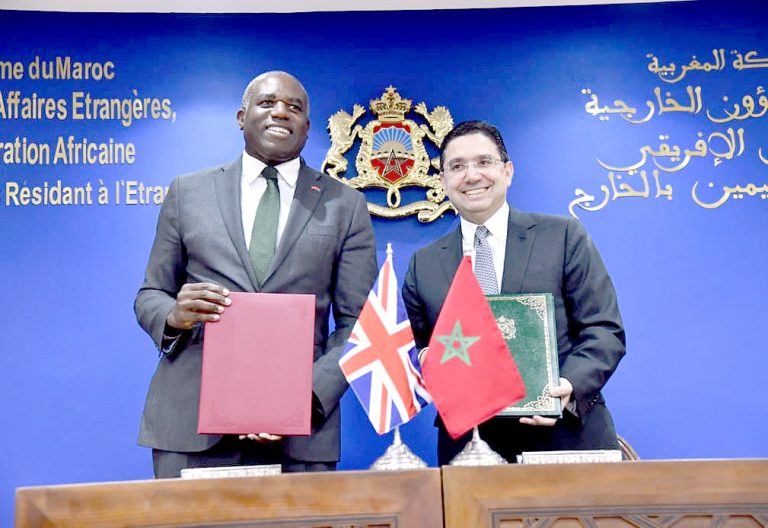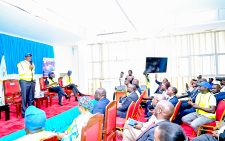UK, Kenya sign pact recognising Morocco’s right over Sahara

Two days ago, the United Kingdom made history by considering the Autonomy Plan after the country signed a crucial diplomatic document with Morocco to recognise the latter’s Territorial Integrity and sovereignty over the Moroccan Sahara.
Secretary of State for Foreign, Commonwealth and Development Affairs of the United Kingdom David Lammy, and Morocco’s Minister of Foreign Affairs, African Cooperation and Moroccan Expatriates, Nasser Bourita, met in Rabat to sign the crucial document that supports the United Nations position on the Sahara.
This development follows last week’s joint communiqué between Kenya and Morocco, where for the first time, Kenya too recognised Morocco’s Territorial integrity of the Sahara when the Prime Cabinet Secretary and Secretary for Foreign and Diaspora Affairs, Musalia Mudavadi, officially opened Kenya’s Embassy in Rabat.
In fact, in the past month, many countries including former Moroccan colonial powers France and Spain identified with the Autonomy Plan that allows the Sahara population some sense of autonomy but leaves Defence, Foreign Affairs, Monetary Currency, Judiciary, National Symbols as well as religious rights and freedoms with the Royal Kingdom of Morocco under His Majesty King Mohammed VI.
On the other hand, the Moroccan Sahara will have a regional budget and taxation, economic policy, cultural affairs, social policy and local police among others.
The wind of change comes at a time when the African Free Continental Trade Area (AfCFTA) is gaining momentum across the continent with monumental trade and industry implications.
It is at a time when Morocco’s policy is heavily skewed in favour of trade with fellow African nations.
The UK, being a permanent member of the UN Security Council, is a major diplomatic breakthrough for the decades-old issue, with the hope of settling this once and for all.
The UK considers Morocco’s autonomy proposal, submitted in 2007 as the most credible, viable and pragmatic basis for a lasting resolution of the dispute over the Moroccan Sahara, and will continue to act bilaterally, including economically, regionally and internationally in line with this position to support resolution of the conflict, so read the document.
The document signed by Bourita and Lammy, hailed Morocco’s role in enabling trade routes for landlocked Sahel countries including Burkina Faso, Mali and Niger even as Morocco is working on a gas pipeline project connecting Nigeria to the European duct.
According to the Horn Institute Executive Director, Dr Hassan Khanenje, the UK endorsement told the Autonomy Plan has been a major success of Moroccan Democracy in recent times.
“The move by the UK is a sign of the great success of Moroccan diplomacy shaping public opinion on the Sahara question, but a great effort must be made to have an amicable solution to the question,” he said.
It is also not lost on historians that Kenya was the country in charge in 1981 when as Chairman of the Organization of Africa Unity (OAU), President Daniel Toroitich Arap Moi was the one that proposed the controversial membership of Polisario at the continental organisation with the Foreign Affairs Minister Dr Robert Ouko moving the motion.
But last week, Kenya and Morocco agreed on the need to schedule the first session of the Morocco-Kenya Joint Cooperation Commission, with the mandate to establish a legal framework governing initiatives that would strengthen bilateral cooperation across several sectors, including commercial, socio-economic and cultural.
Notably, the countries agreed to work on modalities to sell at a discounted rate Phosphate fertilisers to Kenya, crucial in implementing the Bottom-Up Transformation Agenda of President William Ruto.
Morocco, being the largest producer of phosphate fertiliser, having been endowed with large deposits of phosphate rocks, is crucial in world food security.
The recent wave of recognition of Morocco’s sovereignty over the Moroccan Sahara, with over 136 countries backing the autonomy plan, is bound to unlock huge agricultural potential for the World.
The recognition across nations will remove hitherto political and diplomatic bottlenecks that had hindered better access to the crucial Agricultural input.
Kenya’s huge success in subsidising fertiliser from Ksh6,500 a bag two years ago to the current Ksh2,500 is credited to the Moroccan Phosphate Fertiliser secured by the Ruto Administration and has seen a bumper harvest of her staple Maize, with Kenya being self-sufficient in Sugar production for the very first time.
For Kenya, this is not just about consuming what Morocco produces, it goes further to open a huge market for her tea and coffee, with nearly 40 million Moroccans consuming an average of seven cups a day.
Other areas of cooperation in the agreement also had education, maritime affairs and blue Economy as part of possible areas of growth for Kenya in this newfound friendship.















